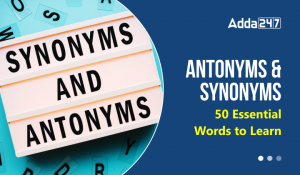
IBPS Clerk Prelims is on its way and a lot of aspirants are heading towards new hopes with this upcoming opportunity. Thus, English Language can be an impetus for their success by helping them save crucial time and score good points in lesser time and effort. So, instead of boiling the ocean, try building up a strong vocabulary, an effective knowledge of grammar, and efficient comprehension skills so as to be on the ball to face this particular section. Here is a quiz on English Language being provided by Adda247 to let you practice the best of latest pattern English Questions for upcoming IBPS Clerk Exam.
Directions (1-15): Read each of the following sentences to find out if there is any grammatical error in it. The error, if any, will be in one part of the sentence. The number (A, B, C or D) of this part is your answer. If there is no error in the statement, then mark option (e) as your answer choice.
Q1. It is true statement (A)/ that a man’s happiness (B)/ or sorrow are to a (C)/ great extent in his own hands. (D)/ No Error (E).
A
B
C
D
E
Solution:
Error in the current question is in part C of the statement. If two different subjects are joined by OR or NOR, then the verb agrees with the nearer subject. Hence, instead of ‘are’, ‘is’ should be used in part C to make the sentence grammatically correct.
Q2. Tyranny is one (A)/ of those evils which (B)/ tend to (C)/ perpetuate itself. (D)/ No Error (E).
A
B
C
D
E
Solution:
Part D is erroneous here. Since the subject here is plural (evils) and verb used is also plural (tend, and not, tends), in place of ‘itself’, ‘themselves’ must be used.
Q3. Aurangzeb will succeed (A)/ to the title in (B)/ the event of the (C)/ death of his elder brother. (D)/ No Error (E)
A
B
C
D
E
Solution:
There is no error in the given statement.
Q4. Ramesh has made to himself a pair (A)/ of batting gloves which is no less protective (B)/ than any of the professional (C)/ batting gloves available in the market. (D)/ No Error (E)
A
B
C
D
E
Solution:
The error is in part A. The using of ‘to’ here has made the statement erroneous. The correct phrase will be, ‘made himself a pair…’
Q5. Raman was the player (A)/ whom they (B) intended should be (C)/ their captain next year. (D)/ No Error (E)
A
B
C
D
E
Solution:
Part B has an error here. Instead of the objective case pronoun – ‘whom’ - a subjective case pronoun- ‘who’ – must be used to make the sentence grammatically correct.
Q6. Rohit said to Raman, (A)/ ‘You are not the first (B)/ person who has had a (C)/ heart-break in love’.(D)/ No Error (E)
A
B
C
D
E
Solution:
There is no error in the given statement.
Q7. The blue eyed student, who (A)/ every teacher in the school thought so (B)/ highly of, failed to win even (C)/ the third prize at the competition. (D)/ No Error (E)
A
B
C
D
E
Solution:
The error is in part (A) of the sentence. Here, instead of the subjective case (who), objective case pronoun, ‘whom’ should be used to make it a grammatically correct sentence.
Q8. Approximately speaking, (A) the distance through (B)/ the nearest town (C)/ from here is 2 kilometres. (D)/ No Error (E)
A
B
C
D
E
Solution:
Part B is erroneous here. In place of ‘through’, ‘to’ should be used here. The usage of ‘through’ is grammatically incorrect.
Q9. I have never likened the phrase (A)/ ‘Iron Man’ for Patel, suggesting (B)/ that he was rigid and (C)/ unshakeable in his views. (D)/ No Error (E)
A
B
C
D
E
Solution:
Part A has an error here. The usage of verb ‘liken’ is grammatically and contextually incorrect here. In place of it, ‘liked’ should be used.
Q10. I belong to the era when (A)/ Patel was negotiating the integral (B)/ of the princely states into (C)/ the Indian Union. (D)/ No Error (E)
A
B
C
D
E
Solution:
Clearly the error is in part B here. Usage of ‘integral’ is completely out of context. Instead, ‘integration’ should be used.
Q11. The statue is of a man who (A)/ had not wanted to make a claim (B)/ to be taller, but to be one among (C)/ the people has been build. (D)/ No Error (E)
A
B
C
D
E
Solution:
Part D has an error here. In place of ‘build’, past participle form of the verb should be used. Hence, in part D, ‘built’ should replace ‘build’.
Q12. Filmmakers, actors and animal rights (A)/ activists will take part in a global march (B)/ demand for justice for tigress Avni (C)/ and her two 10-month-old cubs on Sunday. (D)/ No Error (E)
A
B
C
D
E
Solution:
Part C of the given statement is erroneous. Here, ‘demand for’ must be replaced by ‘demanding’ to make it grammatically correct. It shows that the purpose of the global march is demanding justice for the tigress.
Q13. Change of names of cities (A)/ and roads has been (B)/ an ongoing process (C)/ in independent India. (D)/ No Error (E)
A
B
C
D
E
Solution:
The error is in part A here. Since the sentence describes the ‘change of names’ as an ‘ongoing’, i.e. continuous, process, we must use gerund form at the start of the sentence to make the sentence grammatically correct and meaningful.
Hence, ‘changing’ must be used in place of ‘change of’.
Hence, ‘changing’ must be used in place of ‘change of’.
Q14. “Delhi’s air quality on Saturday improved to the ‘very poor’ (A)/ category after local pollutants “reduced significantly” (B)/ and the contribution from stubble burning remained (C)/ “marginal” due to wind speed”, authorities said. (D)/ No Error (E)
A
B
C
D
E
Solution:
There is no error in the given statement.
Q15. The protesters will be demanded (A)/ safety for Avni’s cubs, an investigation (B)/ into the killing and the resignation (C)/ of Forest Minister Sudhir Mungantiwar. (D)/ No Error (E)
A
B
C
D
E
Solution:
Part A of the given statement is erroneous here. Since the sentence is in future tense, in place of ‘demanded’, ‘demanding’ must be used.
You May also like to Read:





 Practice for English Section: 15 Cloze T...
Practice for English Section: 15 Cloze T...
 English Language Notes for Competitive E...
English Language Notes for Competitive E...










